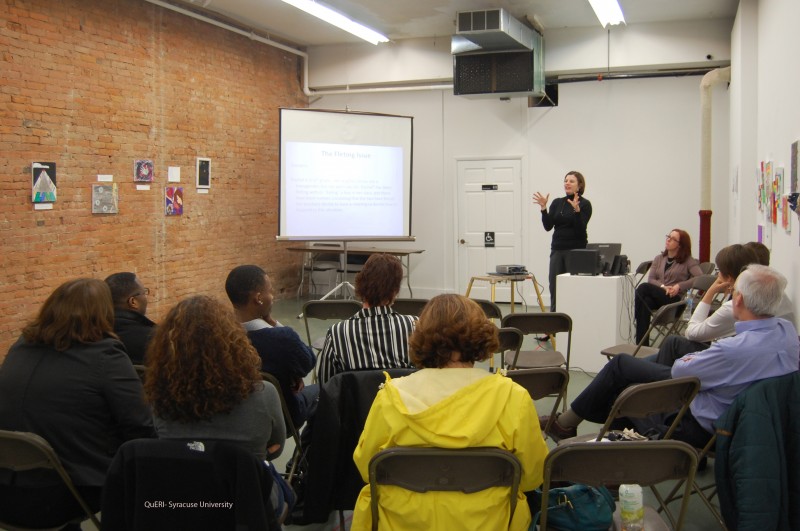© 2024 QuERI
Design by Graph Paper Press
Modified by Ape Science
RSIS workshops will be selectively offered through the LGBT Social Science and Public Policy Center at Hunter College’s Roosevelt House (CUNY) in New York City beginning spring, 2015. For more information email: queri@hunter.cuny.edu.
 No peer reviewed research literature exists on the experiences of transgender children in schools. The few studies that exist on the experiences of trans-identified youth utilize the recollected experiences of older adults as data. In order to develop a Transgender RSIS program, a qualitative research study exploring the experiences of teachers and parents of transgender children is currently underway. Focus group interviews with four parents were conducted in April and May, 2009, and interviews with educators working with transgender children are on-going. Training workshops based upon preliminary data were developed and piloted at the Trans-Health conference in Philadelphia in June 2010. Workshop delivery in elementary schools began in the Central New York area in September 2010.
No peer reviewed research literature exists on the experiences of transgender children in schools. The few studies that exist on the experiences of trans-identified youth utilize the recollected experiences of older adults as data. In order to develop a Transgender RSIS program, a qualitative research study exploring the experiences of teachers and parents of transgender children is currently underway. Focus group interviews with four parents were conducted in April and May, 2009, and interviews with educators working with transgender children are on-going. Training workshops based upon preliminary data were developed and piloted at the Trans-Health conference in Philadelphia in June 2010. Workshop delivery in elementary schools began in the Central New York area in September 2010.
As students transition from elementary to middle school, academic and social dynamics change dramatically. Thus, the middle school RSIS workshop focuses on teaching educators about the “abrupt increase in aggression” (Pellegrini, 2002, p. 151) that occurs in early adolescence as the boundaries between acceptable and unacceptable expressions of masculinity and femininity become more stringent and are regularly “policed” by young people. Youth who do not conform to sexual and gendered expectations of heterosexuality face isolation, ridicule, and physical harassment (Wyss, 2004; Thurlow, 2001). Therefore, this workshop aims to give middle educators the tools to recognize these shifts in their students’ social lives and take action when they witness social isolation and harassment.
Research indicates that the combined effect of lesbian, gay, or bisexual sexual orientation and a high level of in-school victimization is consistently associated not only with truancy, but with higher levels of drug and alcohol use, sexual risk behaviors and suicide attempts (Botempo & D’Augelli, 2002; Fontaine, 1997; APA, 2008). Therefore, schools have an important role to play in efforts to help kids engage in school and avoid these risks. The high school workshop aims to provide educators with tools and knowledge to make LGBT identities visible in the school environment, challenge the marginalization of students who do not conform to the heterosexual norm, and create strategies for school-wide efforts to end physical and verbal harassment. Ultimately, these strategies are meant to aid teachers in helping LGBT kids focus their energy on learning, not resisting or avoiding harassment.
Substance abuse for lesbian, gay, and bisexual youth is, on average, 190% higher than that of their heterosexual peers, and the cause of this discrepancy is connected to the homophobia, discrimination, and harassment that these youth face throughout their daily experiences. (Marshal et al, 2008). Therefore, a goal of this workshop is to educate student support professionals about the link between social stigma and substance abuse and to illustrate the connection between youths’ feelings of isolation and high-risk behaviors. Facilitators identify schools’ responsibility to create safe, affirming environments for all youth and provide tools for making in-school support networks more visible and available for LGBT kids.
Schools cannot change without strong leadership. Educators who work to support and advocate for LGBT youth often claim that lack of administrative support is a barrier to their success (Macgillivray, 2004; Agnastopolous et al, 2009). These educators claim that administrators do not take the issue of school safety for LGBT youth seriously, nor do they consistently enforce anti-harassment policies. Fear of backlash from morally conservative community members prevents many educators from acting on behalf of their students; therefore, school leaders need to be diligent in communicating their intent and procedures for standing behind school employees who might experience resistance (Macgillivray, 2004). The administration training component is designed to provide school leaders with knowledge and skills that will help them establish a school climate where all members of the community can feel secure in the school’s commitment to provide a safe and affirming learning environment for every student.
This training is designed to address the goal of establishing a culture of shared responsibility. In order to effectively implement anti-discrimination policy and establish a supportive school environment, all members of the community must be aware of the effects social stigma have on the school experiences and academic performance of LGBT youth. Because incidences of in-school harassment often occur outside of classrooms (cafeteria, hallways, school buses), school employees who work in these educational spaces playing an important role in maintaining a safe environment and upholding community norms of respect and justice.
This workshop is shorter in length than other RSIS trainings at 45 minutes. It addresses the presence of stigma and oppression in all settings and shared responsibility for school climate. This workshop will also communicate the content and intent of anti-discrimination and anti-harassment policy, as these school employees often have not received the same level of training about their obligation to uphold these policies as classroom teachers and other certified staff.